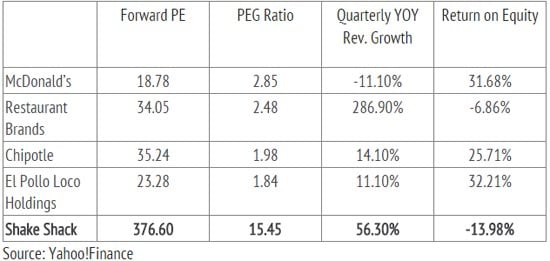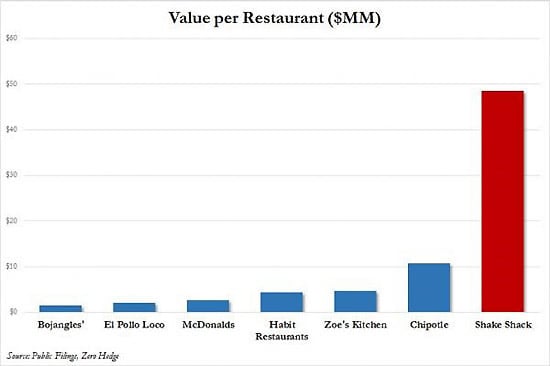CNBC's Sara Eisen asked me last Tuesday if I was still bearish on one of Wall Street and Goldman Sachs Group Inc.'s (NYSE: GS) favorite stocks, even after it had already fallen more than 45% since I warned you last May that it was a bad investment.
"You know this environment, Keith," she told me. "People are paying up for growth companies. The bulls would say this has great brand presence, great brand awareness, and is continuing a careful and steady expansion in the U.S. and abroad."
All excellent points, I replied... but not one of them changes the fact that a tiny company taking market share from huge competitors in a non-growth market does not make it a growth stock.
Then I went for the jugular...
...if this company traded in line with its biggest competitor, the company's stock price would be only $0.66 a share, or 98.22% less than Goldman Sachs suggests.
Here's why this stock's bulls are still in for plenty of heartburn.
When I first pointed to Shake Shack Inc. (NYSE: SHAK) as an investment to avoid last May, the company was trading at roughly 1,200 times earnings - in an industry that had an average price/earnings (P/E) ratio of 40. That's come down to a forward P/E of "only" 376, according to Yahoo! Finance, now that the stock has fallen by 35%.
The bulls take this as a sign of encouragement, noting that the company's stock is somehow more reasonable at $60 a share than it was at $90.
Don't fall for it.
There's still plenty of potential heartburn on the menu.
Shake Shack remains a highly speculative company at best, and not the investment millions of people think it is. Here are five reasons why:
1. Insiders are bailing out.
Shake Shack recently filed for a secondary offering of up to 4 million shares on the eve of the expiration of the company's IPO lock-up period. According to U.S. Securities and Exchange Commission documents, sellers include Chairman Danny Meyer, Green Equity Investors VI, and LP SEG Partners LP, and the chain will not receive a dime.
If they believed Shake Shack stock was cheap and that the company had better days ahead, they'd be holding on or even buying more.
As I noted in this article, individual investors are the last in line when it comes to making money from initial public offerings.
Further, a company like Shake Shack couldn't have been brought public a decade ago when you had to have results rather than just "potential."
2. SHAK still trades at an unwarranted premium compared to the competition.

I realize this is hard to internalize, so let me break it down another way by using the value per restaurant as of last May.

Do you really believe that Shake Shack is worth $50 million per location?
The markets didn't, and I still don't.
In fact, if the Shack is going to achieve a McDonald's-like valuation per location, the company would have to do this...
They'd have to open approximately 864 restaurants representing a 1,170% expansion from the 68 locations they operate today.
If it traded at a P/E ratio comparable to McDonald's, (16.5 until weak earnings pushed the P/E up recently) - the company that recorded earnings of just $0.04 per share last quarter would be priced at $0.66 per share. That's 98.22% less than Goldman Sachs' target price of $37.00 per share.
3. Labor costs are going up.
That's going to be problematic for the simple reason that this will eat into margins. Critics claim labor doesn't matter. Evidently they haven't been to Seattle, where the Washington Restaurant Association's Anthony Anton observed that higher wages are not a political problem but, rather, a "math problem."
According to Anton, 36% of typical Seattle restaurant funds go to labor, 30% to food, and 30% to all other operational costs, with only 4% remaining as profit. That means there's only $28,000 in profit for a restaurant producing $700,000 a year. Just meeting the new $15 an hour legally mandated minimum wage will push labor expenses from 42% to 47%.
It doesn't take a rocket scientist to figure out that prices will go up, fewer people will dine out, and there will be less money to go around. Adding insult to injury, revenue declines, margins rise, and profits fall.
Earnings will naturally follow over time.
4. Shake Shack's menu is complicated and the service sequence is slow.
These two things are critical to any restaurant chain that wants to scale up. You've got to get the food out quickly and at a fair price that justifies the wait once the fad fades and reality catches up. Shake Shack reminds me of Krispy Kreme... right before customers realized that it's very difficult to differentiate a donut, let alone make it "worth" the premium menu price.
This is a fine line fraught with danger, though. If you don't harness the innovation that built your business, your customers will lose interest and find alternatives. This is especially true for restaurants.
5. The metrics don't justify the valuation.
Growth advocates often like to say that a company will grow into the price the market has assigned to it, so they're willing to "pay up." That's fine if you're talking about an especially promising tech company like Apple or even Tesla, but completely delusional for a hamburger chain.
Think about it.
Even if the company's westward expansion is a "runway for Shake Shack," as Jim Cramer rhapsodized, the burger chain's empire will only consist of a few hundred stores within the next couple of years.
Assign it a 50% profit margin (to be generous) for the $9 Shack Stack cheese and 'shroom burger, and the company needs to sell 480 million burgers in a year to justify the current $2.16 billion market capitalization. McDonald's margins are 16%, and they sell 75 burgers a second while feeding close to 1% of the world's population each day, according to Yahoo! Finance, Business Insider, and the company itself.
Can you really look at yourself in the mirror and make the argument that's going to happen with only 68 locations and less than 2,000 employees?
I can't.
And finally, what's happening with Shake Shack is a very serious warning that the markets have become frothy and that investors are chasing hot ideas rather than results.
Never forget that it's one thing to buy a story stock and quite another to hold it for three years...
...then find a greater fool who'll buy it.
Keith on China: While the threat of a Grexit had investors distracted, the Chinese stock market was plummeting 30%. While most pundits are wringing their hands, Keith Fitz-Gerald has a different point of view - one earned from decades of closely following the Asian giant. Here are five realities that put China's market rout in perspective...
About the Author
Keith is a seasoned market analyst and professional trader with more than 37 years of global experience. He is one of very few experts to correctly see both the dot.bomb crisis and the ongoing financial crisis coming ahead of time - and one of even fewer to help millions of investors around the world successfully navigate them both. Forbes hailed him as a "Market Visionary." He is a regular on FOX Business News and Yahoo! Finance, and his observations have been featured in Bloomberg, The Wall Street Journal, WIRED, and MarketWatch. Keith previously led The Money Map Report, Money Map's flagship newsletter, as Chief Investment Strategist, from 20007 to 2020. Keith holds a BS in management and finance from Skidmore College and an MS in international finance (with a focus on Japanese business science) from Chaminade University. He regularly travels the world in search of investment opportunities others don't yet see or understand.



